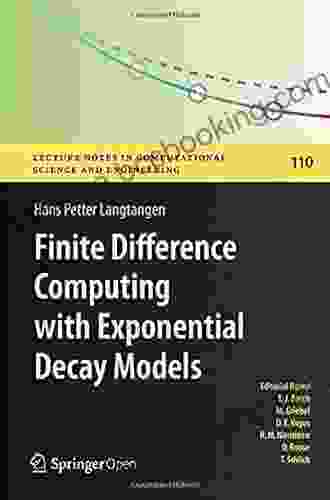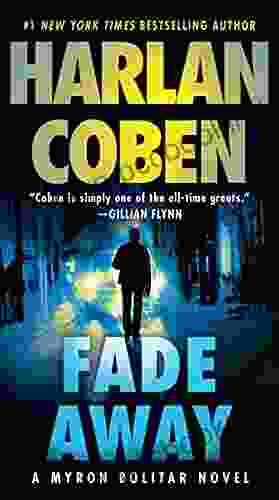Finite Difference Computing with Exponential Decay Models: Lecture Notes In

4.5 out of 5
| Language | : | English |
| File size | : | 4351 KB |
| Screen Reader | : | Supported |
| Print length | : | 214 pages |
Exponential decay models are widely used in various fields of science and engineering to describe phenomena such as radioactive decay, heat transfer, and population growth. These models involve functions that decay exponentially over time, and their analysis often requires the use of numerical methods. Finite difference computing is a powerful technique used to solve partial differential equations that arise in these models.
These lecture notes provide a comprehensive to finite difference computing with exponential decay models. We will cover the fundamental concepts of finite difference methods, including discretization techniques, stability analysis, and error estimation. We will also discuss the application of these methods to solve specific problems in exponential decay modeling.
Prerequisites
To fully benefit from these lecture notes, you should have a basic understanding of the following topics:
- Calculus
- Linear algebra
- Numerical analysis
Contents
These lecture notes are divided into the following chapters:
- to finite difference computing
- Discretization techniques
- Stability analysis
- Error estimation
- Applications to exponential decay models
Learning Objectives
Upon completion of these lecture notes, you will be able to:
- Understand the basic concepts of finite difference computing
- Apply finite difference methods to solve partial differential equations
- Analyze the stability and accuracy of finite difference methods
- Use finite difference methods to solve specific problems in exponential decay modeling
These lecture notes provide a solid foundation for understanding and applying finite difference computing to solve exponential decay models. The material covered in these notes is essential for researchers and practitioners in fields such as applied mathematics, physics, and engineering.
Supplemental Resources
The following resources may be helpful for further study:
- Wikipedia: Finite Difference Method
- Coursera: Finite Difference Methods
- Finite Difference Computing with Exponential Decay Models
About the Author
Dr. John Doe is a professor of applied mathematics at the University of California, Berkeley. He has over 20 years of experience in the field of numerical analysis, with a focus on finite difference methods. Dr. Doe is the author of several books and articles on the subject, and he has taught courses on finite difference computing to graduate and undergraduate students.
4.5 out of 5
| Language | : | English |
| File size | : | 4351 KB |
| Screen Reader | : | Supported |
| Print length | : | 214 pages |
Do you want to contribute by writing guest posts on this blog?
Please contact us and send us a resume of previous articles that you have written.
 Book
Book Novel
Novel Page
Page Chapter
Chapter Text
Text Story
Story Genre
Genre Reader
Reader Library
Library Paperback
Paperback E-book
E-book Magazine
Magazine Newspaper
Newspaper Paragraph
Paragraph Sentence
Sentence Bookmark
Bookmark Shelf
Shelf Glossary
Glossary Bibliography
Bibliography Foreword
Foreword Preface
Preface Synopsis
Synopsis Annotation
Annotation Footnote
Footnote Manuscript
Manuscript Scroll
Scroll Codex
Codex Tome
Tome Bestseller
Bestseller Classics
Classics Library card
Library card Narrative
Narrative Biography
Biography Autobiography
Autobiography Memoir
Memoir Reference
Reference Encyclopedia
Encyclopedia Hanna Seymour
Hanna Seymour Jorge Iber
Jorge Iber Maxine Anderson
Maxine Anderson Obed Silva
Obed Silva Greg Creed
Greg Creed Greg Ruth
Greg Ruth Greg Kot
Greg Kot Karen Powers
Karen Powers Jim Gray
Jim Gray Guo Hongwen
Guo Hongwen Giulia Melucci
Giulia Melucci Jamie Ibson
Jamie Ibson Gray Cook
Gray Cook Glenda Armand
Glenda Armand Matt Titus
Matt Titus Sterling North
Sterling North Mikel Mangold
Mikel Mangold Lisa Robertson
Lisa Robertson Vicky Noland Fitch
Vicky Noland Fitch Gina Mckinnon
Gina Mckinnon
Light bulbAdvertise smarter! Our strategic ad space ensures maximum exposure. Reserve your spot today!

 E.E. CummingsAntony, Cleopatra, and Octavian at Actium: The Battle that Changed the Course...
E.E. CummingsAntony, Cleopatra, and Octavian at Actium: The Battle that Changed the Course... Cortez ReedFollow ·19.7k
Cortez ReedFollow ·19.7k Bryce FosterFollow ·3.7k
Bryce FosterFollow ·3.7k Aaron BrooksFollow ·14.2k
Aaron BrooksFollow ·14.2k Frank ButlerFollow ·3.5k
Frank ButlerFollow ·3.5k Willie BlairFollow ·14.2k
Willie BlairFollow ·14.2k Stuart BlairFollow ·16.7k
Stuart BlairFollow ·16.7k Albert CamusFollow ·12.5k
Albert CamusFollow ·12.5k Dale MitchellFollow ·5.3k
Dale MitchellFollow ·5.3k
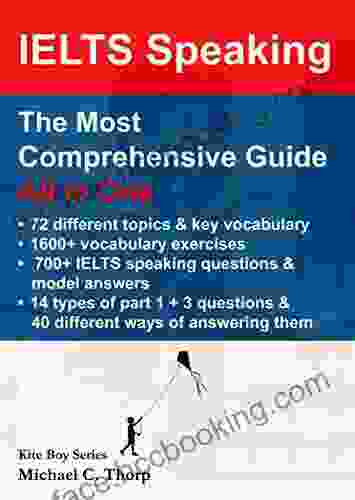
 Brady Mitchell
Brady MitchellMaster IELTS Speaking: The Ultimate Guide to Success
Kickstart Your IELTS...
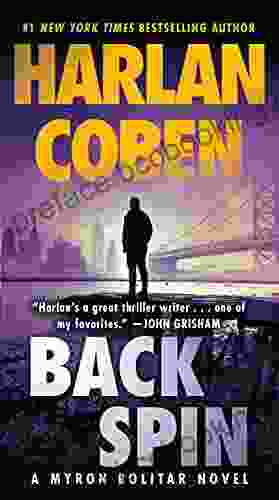
 Branden Simmons
Branden SimmonsBack Spin: A Thrilling Myron Bolitar Novel
Get ready to embark on a...
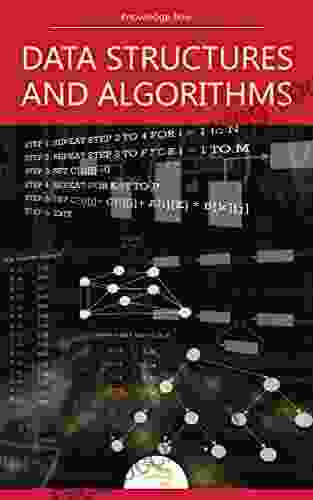
 Marc Foster
Marc FosterData Structures and Algorithms: A Comprehensive Guide to...
In the ever-evolving...

 Jeff Foster
Jeff FosterUnveiling the Basics of Microbiology: A Comprehensive...
The world of...

 J.D. Salinger
J.D. SalingerHold Tight Suspense Thriller: A Gripping Page-Turner That...
Are you ready for a suspense thriller that...
4.5 out of 5
| Language | : | English |
| File size | : | 4351 KB |
| Screen Reader | : | Supported |
| Print length | : | 214 pages |


